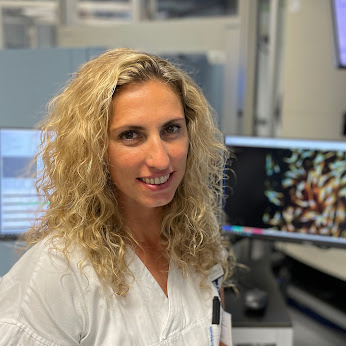According to the scientists we spoke with, NICR is a key link between top-quality research, clinical practice, and the needs of the society. They especially appreciate that NICR managed to connect previously separate institutions, create a functional network, and accelerate the transfer of research results to patients. Another strength of NICR is the support it provides to the new generation of experts and to international collaborations. They believe that, in the future, the NICR should strengthen its communication aimed at the general public and do more to involve patients. At the same time, it should function as the voice of the academic community when it comes to formulating state’s healthcare policies.
- What is, or should be, the role of NICR in the society?
- What would you say is something that NICR does really well?
- What else NICR could and should do more, or rather what should we ask it to do?
 Alžběta Srovnalová
Alžběta Srovnalová
Olomouc node, Institute of Molecular and Translational Medicine of Palacký University and the University Hospital Olomouc
Focus on high-capacity screening using cell-painting assay
- I see NICR as an important bridge between top-level scientific research, medical practice, and the needs of the whole society. Its role is not limited to coordinating cancer research in the Czech Republic. It also tries to make sure that research results find their way to the patients as quickly as possible, be it in terms of more precise diagnostics, more advanced therapies, or better prevention. NICR also plays an important role in education and popularisation. It educates the new generation of scientists and physicians, strengthens cooperation between various areas of specialisation, and brings science closer to the lay public. Thanks to this, it can not only help patients but also make sure that the Czech society has greater trust in medicine and scientific institutions. And last but not least, NICR should function as a partner of the state and its institutions, provide expert opinions, help establish effective strategies in cancer care, and thus indirectly contribute to a long-term sustainability of the healthcare system.
Naturally, it also faces challenges. NICR should avoid excessive bureaucracy, facilitate real coordination between institutions, and above all secure sustainability even after the end of current financing in 2025. If it succeeds in these efforts, it could make a truly crucial long-term contribution not only to the scientific community but to the society as a whole.
- What I see as its greatest contribution is that NICR managed to mutually connect institutions which previously functioned largely in isolation. It created a real network of scientists, clinical departments, and other partners across the Czech Republic, and managed to orient all these participants at one single goal: a better cancer prevention and cancer treatment. NICR is also doing very well at training the next generation of experts and opening space for international cooperation. All these are foundations without which no significant results can be expected.
- NICR should focus even more on making sure that research results find their way to common clinical practice and really help patients as quickly as possible. It should also reinforce its communication aimed at the lay public: explain why research is important, how prevention works, and why everyone can actively contribute to protecting own health. In the future, it will also be demanded of NICR that it be long-term sustainable, not just financed as a project, and that it becomes a stable partner for the state and the healthcare system.
 Sabina Ševčíková
Sabina Ševčíková
Brno node, Faculty of Medicine of the Masaryk University
Focus on liquid biopsies of monoclonal gammopathies
- NICR plays a key role in the fight against cancer in the Czech Republic. Its main aim is to support research that leads to new methods of cancer diagnostics, treatment, and prevention. It also supports scientists, clinicians, and institutions in their efforts to transfer research results into clinical practice as soon as possible. The role of NICR in public awareness campaigns, support of screening programs, and education is, in my view, also important. Aside from this, NICR cooperates with the government on formulating the national strategy of fighting against cancer and helps improve the general quality of cancer care in the Czech Republic.
- NICR is doing very well in its focus on research and links to its implementation in patient care. It facilitates collaboration of specialists from various fields, which accelerates the development of new diagnostic methods and treatments. NICR makes cooperation between research institutions simpler and more straightforward. Aside from this, it is active in awareness campaigns, and it supports prevention, which has a real impact on early detection of cancer.
- NICR could do more to involve patients in its research projects ,and ultimately also the society at large, to meet real social needs. It could also boost collaboration with secondary schools and young scientists to support the new generation of oncology experts. In prevention, NICR could be more active about participating in public awareness campaigns that motivate people to undergo screening and a healthier lifestyle. And, last but not least, it should function as the voice of the expert community in the process of forming healthcare policies.
Michal Tichý
Prague node, Institute of Organic Chemistry and Biochemistry of the Czech Academy of Sciences
Focus on the medicinal chemistry of nucleic acids
- In view of the large network of research teams from various regions that were brought together by NICR in order to conduct cancer research better and more effectively, the role of NICR is irreplaceable. Moreover, this takes place in a situation when various kinds of cancer affect ever more people. In the past four years, NICR has managed to create a unique structure: the project is highly productive and after the initial phase, one could expect that the role of NICR will further grow – that is, unless someone decides that NICR should end…
- NICR is definitely very good at cancer research, both basic and translational. The consortium has managed to connect the best research teams, deepen their mutual collaboration, and make it more effective. It remains to be seen, however, how it is going to keep on doing that if the financing stops at the end of the year.
- NICR does a lot of things, from great research all the way to popularisation of science and work on improved public awareness, but there is always space for improvement. Some contributions on social networks indicate that especially public awareness campaigns do not work quite as well as one would wish. What we should ask NICR to do is what it does best: research, education, and the like, that is, things that actually or potentially lead to a real contribution to patients. What we should not ask from NICR are the heaps and piles of tables, reports, and debates about whether this or that output should go in table no. 1 or table no. 2. That is a waste of time that could most definitely be used more meaningfully.
Jaroslav Truksa
Prague node, Institute of Biotechnology of the Czech Academy of Sciences
Focus on tumour resistance
- I think the role of NICR is not only to coordinate research and link individual research teams but also communication aimed at patients, the lay public, and the political representation.
- I would say NICR had succeeded in linking research institutions, in producing relevant and up-to-date reports about research, and in coming up with new treatment directions. Moreover, this project helps to link the clinical and the scientific perspective. NICR’s activity on social medial is a great idea: it helps share information especially with young people.
- NICR should above all keep on functioning, follow up on its successes, and help to coordinate and link scientists whose work is related to cancer. This, and work on public awareness and sharing of current information. Another thing that should definitely continue are the Czech Annual Cancer Research Meetings in Olomouc. The organisation as such should also integrate into European networks, such as the European Association for Cancer Research (EACR).



